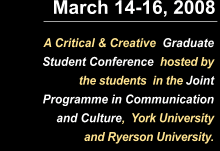









 Keynote Speaker
Keynote Speaker|
"A Morbid Principle in Terminal Space: Precarious Passages, Unsettling
Viral Mobilities, and Other Anxieties at the Airport" By: Dr. Penelope Ironstone-Catterall Airports are often considered to be liminal spaces. In "Traveling Cultures," for example, James Clifford coupled airports with hotels as sites of a sometimes troubling but nonetheless romantic liminality central to the history and projects of ethnographic research. Rosi Braidotti paints the airport as a site of possibility for the production of nomad subjectivities produced by numerous passages in global space. Other theorizing on airports suggests that they are not just sites accommodating and promoting flows and mobilities - that is, are not simply liminal - but are also rigidly policed to promote maximal surveillance and orderly flow, a flow in which terminal space is colonized so as to create a hybrid space mixing consumption (the mall) and travel (the airport). This paper is situated between romantic theorizations of the airport as a site of passage marked by freedom, nomadism, and seemingly endless mobility in global space, and critical engagements that suggest the airport constitutes a "state of exception," a laboratory which strips would-be passengers of juridical or other forms of state-sponsored personhood in the name of a social and technological experiment called "security." Not simply a liminal space, nor a space more properly understood as liminoid (that is, gesturing toward and perhaps even promising but never achieving liminality in any sustained way), the airport is populated by transient entities that are difficult to romanticize. I refer here to microbes in general and viruses in particular, the morbid principle of my title that can be seen as moving through terminal space and onto the global scene. Anxieties regarding unsettling viral mobilities are linked to anxieties surrounding precarious passages in order to build a theoretical narrative in which anxieties accumulate because their focus is perpetually shifting. Fear of flying (or, better, of falling from a great height), fear of terrorism, and fear of contagion will be linked in this narrative in order to illustrate how the anxious subject is articulated in terminal space. Biography: Dr. Penelope Ironstone-Catterall is a faculty member in the Department of Communication Studies and Coordinator of the Program in Cultural Studies at Wilfrid Laurier University. Her central pedagogical and research interests concern the mechanisms deployed to resist difficult information - be it information regarding social difference or information concerning health and illness - and the social and political consequences of these resistances. More generally, her interests include risk, media and the politics of anxiety, queer theory and cultural production, and cultural studies of science, medicine and technology. She edited a special issue of Space & Culture: An International Journal of Social Spaces (London: Sage, 2001) on "Love and Mourning" and has published in the areas of social and cultural responses to HIV and AIDS, mourning and grief studies, cultural studies of risk, feminist research methodology, post-9/11 politicality and psychoanalysis, and queer cultural production. Her current research project is called "From Seasonal Flu to Pandemic Influenza: The Cultural Life of a Virus." She also spends considerable time in airports. |


Copyright (C) 2008 by Communication and Culture Graduate Student Association. All rights reserved.
Past Conferences: 2007 | 2006 | 2005 | 2004 | 2003 | 2002